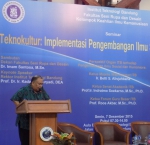PSLH ITB and Udayana University Discuss Gender Equity, Disability, and Social Inclusion in Water Sanitation and Hygiene
By Adi Permana
Editor Adi Permana

BANDUNG, itb.ac.id—On Friday (02/03/2023), a webinar entitled "Gender Equity, Disability, and Social Inclusion (GEDSI) in Water Sanitation and Hygiene (WASH)" was held to talk about social-related issues. Several speakers were invited to engage in the discussion.
This webinar was a collaboration between a number of parties, namely the Center for Public Health Innovation, Udayana University's Public Health Sciences Study Program, and ITB's Center for Environmental Studies (also known as PSLH ITB).
The first speaker was Dr. Anindrya Nastiti, S.T., M.T., a lecturer of ITB's Environmental Engineering and Environmental Infrastructure Engineering. She presented about sustainable sanitation for marginalized groups in eastern parts of Indonesia. She elaborated on research conducted in NTB and NTT, primarily in West Manggarai and Central Lombok, on sanitation practices and how the local community perceived them. Moreover, she provided thorough analysis and recommendations regarding sanitation in said regions.
The second speaker, Bronwyn Powell, discussed water, sanitation, and hygiene inclusively in tourist sites. Tourism is one of the main contributors to economic growth, yet it also demands a lot of natural resources like water, hence requiring further consideration and regulation. In the context of WASH, she introduced the concept of Leave No One Behind (LNOB). LNOB has three principles for addressing related issues: examine, empower, and enact.
The third speaker, Silvia A. Landa, shared about Total Sanitation Based on Gender Equitable and Socially Inclusive Community (abbreviated as STBM GESI) in Indonesia. She narrated her story during her expedition in Manggarai District, NTT and Sumbawa District, NTB. The speaker elaborated on STBM GESI based on her previous experience at Plan International Indonesia. The core of the STBM policy consists of five different pillars of healthy living, namely stopping practices of open defecation, washing hands with soap regularly, controlling household drinking water and foodstuff, handling solid household waste, and managing liquid household waste. She also talked about the results of her study regarding institution, regulation, planning, supervision, and funding.
The fourth and last speaker was Edmund Weking, who described WaterAid's journey with GEDSI WASH. WaterAid was initiated in 1981 and has now expanded to 27 countries around the world. WaterAid aims to solve inequalities in access, resource management, and decision-making in WASH. In addition, Edmund shared the framework employed and the process WaterAid had undertaken to realize its objective.
Reporter: Hasna Khadijah (Environmental Engineering '19)
Translator: Ariq Ramadhan Teruna (Chemical Engineering '21)

.jpg)
.jpg)
.jpg)
.jpg)
.jpg)

.jpg)

